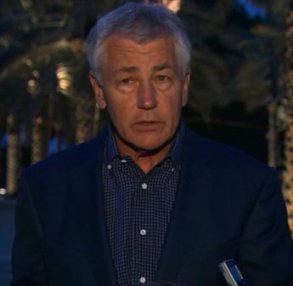With evidence that the chemical weapon sarin has been used in Syria on a small scale, the United States should take the lead in crafting a response, an Israeli official said Friday.
"I think the U.S., as the leader of the Western world, should lead the efforts with our partners in Europe and Israel and to take action with what we're seeing happening today in Syria," Israeli Deputy Defense Minister Danny Danon told CNN.
Danon said he could confirm what Israeli military intelligence has reported about Syria's alleged use of chemical weapons.
"I will not go into specifics, but I can tell you very clear that we know that Syria has used chemical weapons," he said.
 Chuck Hagel Chuck Hagel
|
U.S. Defense Secretary Chuck Hagel said Thursday there was evidence that sarin has been used in Syria.
But numerous questions remain about the origins of the chemical and what effect its apparent use could have on the ongoing Syrian civil war and international involvement in it.
Syria's information minister has denied using chemical weapons saying the U.S. and UK claims lack credibility and are an attempt to put pressure on the Bashar al-Assad government. Omran Al-Zoubi, interviewed by state-run Russia Today, said even if the government had chemical weapons, it would not and could not use them.
When asked whether the intelligence community's conclusion pushed the situation across President Barack Obama's "red line" that could trigger more U.S. involvement in the war, Hagel said it's too soon to say.
In a letter sent to lawmakers before Hagel's announcement, the White House said that intelligence analysts have concluded "with varying degrees of confidence that the Syrian regime has used chemical weapons on a small scale in Syria, specifically the chemical agent sarin."
The White House cautioned that the "chain of custody" of the chemicals was not clear and that intelligence analysts could not confirm the circumstances under which the sarin was used, including the role of Syrian President Bashar al-Assad's regime.
British Prime Minister David Cameron said that he supported Obama and that the use of chemical weapons should form a "red line," the UK Press Association reported.
But if a red line has been crossed, Cameron was less clear on what the next steps should be.
Asked if the development could result in sending troops into Syria, Cameron said he didn't want to see that.
"But I think we can step up the pressure on the regime, work with our partners, work with the opposition in order to bring about the right outcome," he said, according to the Press Association. "The question is how do we step up the pressure. And, in my view, what we need to do -- and we're doing some of this already -- is shape that opposition, work with them, train them, mentor them, help them, so that we put the pressure on the regime and so what we can bring this to an end."
The Syrian government has been battling a rebellion for more than two years, bringing international condemnation of the regime and pleas for greater international assistance.
The United Nations estimated in February that more than 70,000 people had died since the conflict began.
The opposition Local Coordination Committees in Syria reported that 19 people, including three children, had been killed across the country Friday.
CNN's Sara Sidner, Saad Abedine and Michael Pearson contributed to this report.























































































































































































































































































































































